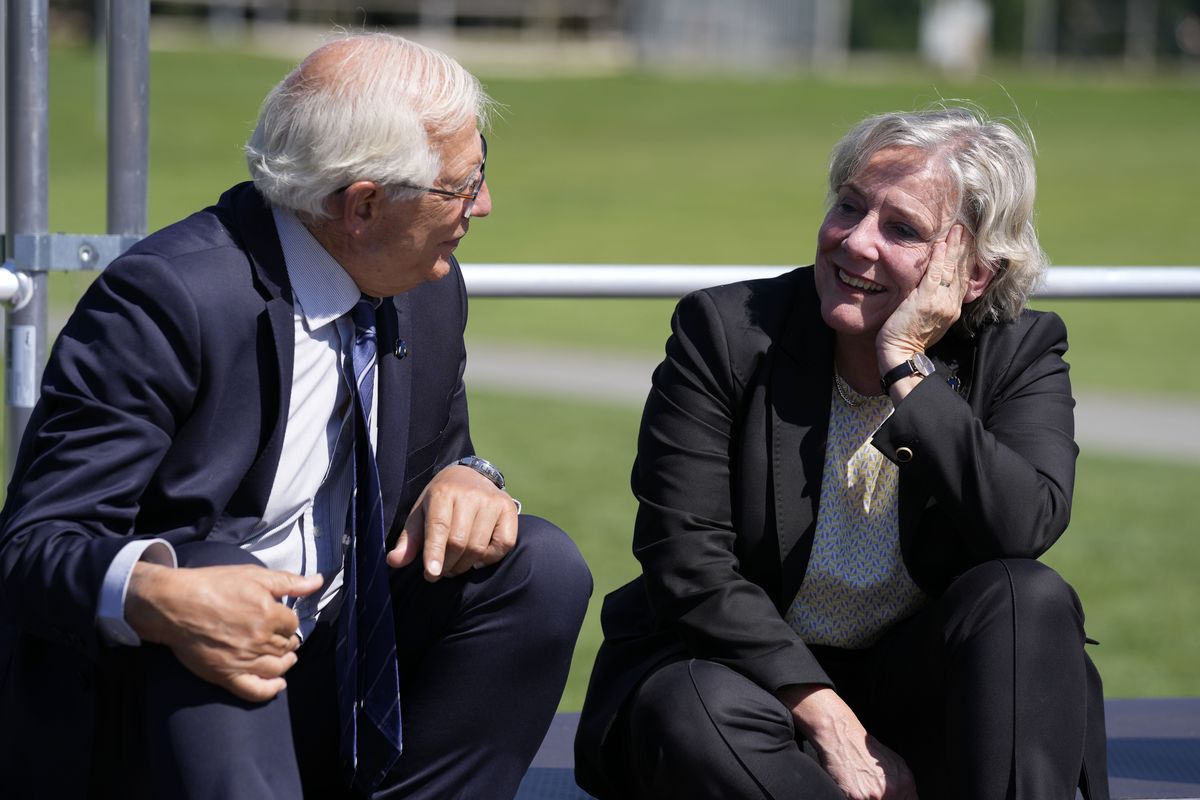EU pushes for more autonomy amid Afghanistan fallout

BRDO CASTLE, Slovenia — Still reeling from the European Union’s shortcomings in Afghanistan, officials from the 27-nation bloc on Thursday discussed ways to improve their response to future crises and not be so reliant on the U.S.
“Afghanistan has shown that the deficiency in our strategic autonomy comes with a price,” EU top diplomat Josep Borrell said following talks in Slovenia with defense ministers that also involved NATO and UN officials. “And that the only way forward is to combine our forces and to strengthen not only our capacity, but also our will to act.”
During their meeting, European defense ministers looked at ways to improve the bloc’s operational engagement and develop a rapid response force capable of operating in difficult military theaters. They also discussed plans for the so-called strategic compass, a document aiming at harmonizing crisis management and defining defense ambitions for the bloc that is expected to be drafted before the end of the year.
Their foreign affairs counterparts later met for a debate on the future relationship the EU wants to develop with the Taliban. Borrell said the bloc needs to take into account the country’s new political reality and to define how it will engage with the new rulers.
The EU has set conditions for working with the Taliban, including the respect of human rights and the safe passage of those still willing to leave the country.
“Certainly we have to develop an engagement with the Taliban for many issues,” Borrell said, adding that the most pressing issue was to bring help to those looking for a way out.
Borrell insisted that the people leaving the war-torn country should not be treated as migrants but considered as asylum seekers amid fears in many member states that an Afghan refugee crisis could soon develop in Europe.
One EU official with direct knowledge of the ministerial discussions said there was a general consensus among defense ministers to acknowledge the “fiasco” that followed the withdrawal of Western troops from Afghanistan.
The Taliban’s takeover and the rushed airlift operation that followed the U.S. decision to pull out have laid bare the EU’s dependency on its ally. Without American support, European countries wouldn’t have been able to guarantee the safe exit of their citizens or even their troops.
“The strategic situation, the geostrategic changes, show that now we need a stronger Europe,” said Claudio Graziano, the chairman of the EU military committee. “The situation in Afghanistan, Libya, Middle East, Sahel, show that now it’s the time to act starting with the creation of a rapid European entry force able to show the will of the European Union to act as a global strategic partner. When if not now, later would be late.”
But finding a consensus among the 27 EU member states to create such a standby EU force of around 5,000 troops is not an easy task.
European countries on the border with Russia often oppose the idea of autonomy, for instance Poland and the Baltic nations. EU heavyweight Germany is also a strong supporter of using NATO for security operations and keeping the U.S. defense umbrella in Europe.
“We don’t have yet a complete unanimity, I would be lying to you if today everybody agreed on that explicitly,” Borrell said.
He added that in light of the disengagement of the U.S. on the international scene, the EU has no other option than to increase its capacity to act independently.
“It’s nothing against NATO, it’s nothing against the EU-US alliance, it’s a way of becoming stronger, facing our responsibilities and mobilizing the resources in order to face the challenges that we will have to face,” he said.
The EU is already endowed with rapid reaction teams — so-called battlegroups — each made up of about 1,500 personnel. But they have never been used in major crises, and the bloc doesn’t deploy EU missions to active conflict zones.
German defense minister Annegret Kramp-Karrenbauer said the focus now would need to be on the kinds of troops needed to conduct a mission such as the U.S. military-run evacuation from Kabul airport.
“It’s not about what NATO does or what the EU does,” she added. “To some extent it’s about what we as Europeans do in NATO.”
Slovenian Defense Minister Matej Tonin, whose country currently holds the EU’s rotating presidency, said defense ministers also debated how to send soldiers abroad even without consensus, by lifting the unanimity requirement.
“Maybe the solution is we invent a mechanism where a classical majority will be enough and those who are willing will be able to go,” he said. “If a majority within the European Union decides to send somewhere the troops, they can go in the name of the European Union. And the countries which will participate in these groups will be let’s say the willing countries. So that we don’t force the countries who don’t want be part of that mission.”